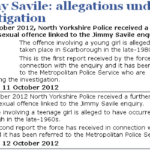NYP Fails Child-Abuse Inspection
by TIM HICKS
~~~~~
Introduction
Her Majesty’s Inspectorate of Constabulary and Fire & Rescue Services (HMICFRS) has reviewed North Yorkshire Police’s child protection services and determined that the standard of its child protection is “poor”.
The report can be read here: https://www.justiceinspectorates.gov.uk/hmicfrs/news/news-feed/north-yorkshire-police-needs-to-improve-child-protection/
I have read the report and it covers a lot of ground. Some of its comments are very positive. Although I do not agree with all of its conclusions, it is a good, well-reasoned, factual report.
Failure of child protection in North Yorkshire Police
The report makes shocking reading:
- The standard of investigations in child protection cases, such as missing children or chid sexual exploitation (CSE), is poor. This is because the force allocates cases inconsistently.
- It has an inconsistent approach to the risk from those suspected of sexually exploiting children. This shows officers don’t always understand their primary role, which should be to protect children.
- Staff in the custody suites often determine vulnerability when they see children in police detention. But they think investigating officers should be responsible for making referrals to children’s social care (CSC) services – even though some children’s vulnerability only becomes apparent in police detention.
- We found some specialist units don’t understand their safeguarding responsibility well enough. Online abuse team (OAT) officers see their primary role as focusing on offenders, rather than protecting children.
- Until now, staff training and awareness measures have relied on the use of email and online training packages. A large proportion of the officers dealing with child abuse investigations have had no specialist child abuse investigation training.
The key statistic is that out of a sample of 73 cases involving vulnerable children that HMICFRS reviewed, only 13 cases (18%) were properly handled. A sample is taken to draw conclusions on a wider population. Assuming that HMICFRS took a 5% sample, this means that the population of safeguarding cases was 1,460 – of which 1,197 (82%) were not properly dealt with.
So what are the reasons behind this disaster?
Failure of Force Intelligence at all points of the intelligence cycle.
Historically, North Yorkshire Police has demonstrated failure after failure to collect, process, analyse and disseminate intelligence. Many of these failures were revealed by the NYE.
A classic example was the Operation Spade fiasco. The Toronto Police Service wound up an international paedophile network with members in North Yorkshire in an operation that was code named Operation Spade. It led to nearly 350 people being arrested internationally, including six law enforcement officials, nine religious leaders, forty school teachers, three foster parents, thirty-two children volunteers and nine doctors and nurses. One US Government Official committed suicide after he was arrested and three hundred and eighty-six children were rescued from abusers. This was described as a highly successful operation internationally. Everywhere, that is, except North Yorkshire, where the Force Intelligence Bureau did not bother recording or acting on any of the information it received from the Toronto Police.
The Intelligence Cycle is the process of developing raw information into finished intelligence to use in decision making and action.

The report reveals:
- In cases where highly vulnerable children had gone missing from children’s homes, they were not recorded as “missing“. Being instead mis-recorded as a “cause for concern“, so officers did not actively have to look for them. This conveniently reduced their workload, but abandoned the child. A failure of supervision, intelligence collection and processing.
- Inspectors found the way information was shared between agencies dealing with child safeguarding was “inconsistent“, with cases involving missing children, child sexual exploitation or other child protection matters all being described by the force in a similar way. A failure of supervision and intelligence processing.
- “Officers don’t always share information quickly enough with safeguarding partners”. A failure of intelligence dissemination.
- “offender managers don’t routinely share information about RSOs (Registered Sex Offenders) in briefing material. And staff in neighbourhood teams don’t report intelligence collection as part of their day-to-day duties. Neighbourhood teams can use Niche to search for RSOs in a particular area, and the force has promoted this function. But we found teams are rarely doing this. We also found frontline officers add very little intelligence to Niche.” Failures in intelligence collection and processing.
- “In North Yorkshire, we found that officers view the recording of information on both ViSOR (the national system for recording and sharing intelligence on Registered Sex Offenders) and Niche (the force’s records management system) as duplication. This means they don’t always record information on both systems. They should be doing this. When an offender moves to another area or travels between areas, other forces can see the records on ViSOR if the information has been recorded properly. Officers in North Yorkshire don’t consistently record information on both systems, so when an offender travels from the area, other forces don’t have all the information they need.” This is a failure of supervision, intelligence collection, collation and dissemination. When other forces look on ViSOR, the offender’s history will not appear, because North Yorkshire Officers haven’t bothered recording the information, thereby endangering children in other force areas.
The conclusion is inescapable that North Yorkshire Police is still not capable of collecting, processing, analysing and disseminating intelligence on safeguarding. Nothing has changed since Project Spade, Peter Jaconelli and Jimmy Savile, because successive Chief Constables have categorised child protection as low priority.
Failure of leadership at Sergeant and Inspector level
The report states that:
- “In most of the cases we reviewed, there was little case direction from sergeants. Safeguarding plans were often missing, even when the case was complex. Often, supervisors’ first involvement with cases is at the time of case closure. And they often don’t discuss the case with the investigating officer.“
- “We saw very few cases where an inspector had reviewed investigations, especially cases allocated to response teams. This leads to drift and delay in many investigations.”
- “We also found that supervisors don’t oversee investigations well enough, mainly because they lack the training, skills and experience.”
Disbandment of the Protecting Vulnerable Persons Unit
The report states:
“It (NYP) allocates some child abuse investigations to detectives in the CID, and others stay with frontline officers, with supervision by a detective sergeant. But frontline officers aren’t trained to conduct child protection investigations, and joint working with other organisations (such as joint visits and joint interviews) doesn’t take place often enough.”
During the investigation into the failure by Greater Manchester Police (GMP) to investigate and prosecute grooming gangs in Manchester, it was alleged that GMP allocated resources to “acquisitive crime” (burglaries, theft, robberies), away from safeguarding children. One of the officers allegedly involved in this decision was North Yorkshire’s former Chief Constable Dave Jones.
NYP used to have a Protecting Vulnerable Persons Unit (PVPU) but this was disbanded. The detectives and supervisors in it were specialists that wanted to do that type of work, received specialist training to perform it and could obtain support from more experienced colleagues within the unit. Removing specialist Officers and allocating them to local CID teams, has obviously led to a dilution in the quality of child protection investigations and the allocation of more resources to ongoing CID work.
It appears to me that the PVPU was disbanded because North Yorkshire Police pursued a similar policy to GMP of focussing on “acquisitive crime”. This is borne out by this damning comment from the report:
“The Force [i.e. Chief Officers, who set policing priorities] doesn’t prioritise safeguarding and child protection highly enough in operational activity.”
In my view, disbanding the PVPU was a strategic blunder that has led in large part to the current situation.
Failure of leadership at Senior Police Officer level
It appears that senior officers are not able to accurately review the quality of safeguarding in NYP. According to the report:
“The force also needs to improve the way it measures how well staff perform. Although it has reviewed various aspects of its work involving children, it doesn’t do this routinely. As such, it doesn’t know how effective its interventions are. This makes it difficult for senior leaders to assess how good decision-making is, and to be sure officers and staff are always making the best decisions for vulnerable children.”
“There was also very little evidence of cases being supervised, or of meaningful involvement from first and second line managers.”
In short, Chief Officers are not ensuring and exercising adequate supervision over their subordinates and this is probably why there have been the above failures of supervision at Sergeant and Inspector level.
The failure to provide staff with adequate training in how to conduct child abuse investigations is a very serious failure of NYP’s senior management. In this context, I cannot help but point out that while Chief Constable Winward was using the training budget to finance her trips to exotic European cities under the guise of training with her FBI chums; frontline Officers were not being provided with adequate training to safeguard children.
The report reveals that NYP Chief Officers were already aware from their own internal reviews of safeguarding cases that the standard was inadequate. Clearly these failures should have been addressed long before the HMICFRS review and they weren’t. A complete failure of Chief Police Officer leadership.
This statement from the report is the incisive:
“Leaders don’t oversee child protection well enough, either strategically or operationally.”
Failure by Police, Fire & Crime Commissioner Metcalfe to hold the Chief Constable to account for the failure of her Force to protect children.
Understandably, this report caused concern to the Police, Fire & Crime Commissioner for North Yorkshire, Zoë Metcalfe, who very properly called in the Chief Officer Team for a public accountability meeting on this issue.
Chief Constable Winward, Deputy Chief Constable (DCC) Hussein and Assistant Chief Constable (ACC) Lindsay Butterfield attended and talked through a very impressive, slickly prepared presentation. There were many positive points made in the presentation and I asked for a copy of it to publish with this article.
Commissioner Metcalfe’s statement on the report and a video of the accountability meeting can be accessed here: https://www.northyorkshire-pfcc.gov.uk/news/ncpipam8april2022/
I have a number of concerns about the content of the meeting as follows:
- At 6.24 Commissioner Metcalfe states that children in North Yorkshire and York have not been as well protected as they should have been. At 37.55 ACC Butterfield states that all the cases audited by HMICFRS (73) in the inspection will be re-visited and the information checked to ensure it is in both VISOR and Niche. This of course ignores all the other cases in the full population (1,460 estimated), ensuring no corrective action will be taken and ignoring NYP’s wider duty to support the protection of children in other force areas beyond North Yorkshire. A classic example of silo mentality.
- It is unclear if all the cases where highly vulnerable children had gone missing and been mis-recorded as a “cause for concern” instead of “missing” have been reviewed and corrected. If this has not occurred then those children are still at risk.
- At no point did anyone confirm that the estimated 1,197 safeguarding cases which had not been performed satisfactorily, had all been re-visited and corrective action taken to ensure the child was now properly safeguarded. If this has not occurred then those children are also still at risk.
- Many of the issues relate to recording and sharing of intelligence on RSOs and vulnerable children. However, the Director of Force Intelligence is not one of the Bronze Commanders involved in the response. This prevents an integrated approach to intelligence gathering.
- At 27.5 it emerged that until the HMICFRS report, NYP force policy on missing children did not comply with best practice as specified by the College of Policing. That is a disgrace and demonstrates the low priority Chief Constable Winward allocated to child protection. It also begs the questions why was force policy not updated when the best practice guidance was issued and how many other areas of force policy do not meet best practice?
- At 53.00 ACC Butterfield states that moving the PVP officers into CID did not lose anything in terms of skills and capability. This is ridiculous and thee report does not bear this out. At 35.26 ACC Butterfield then states that specialist officers are now sitting in CID teams and they will be fully trained by December. Removing specialist officers has obviously led to a loss of skills and the diminution of the force’s ability to efficiently safeguard children. The decision to return to fully trained specialist officers de facto admits this. Interestingly, the GMP has recognised its policy was wrong and established a unit of specialist safeguarding officers.
- I was not able to submit questions about the above concerns to the meeting, because I am currently proscribed by the Commissioner.
[That’s the price you have to pay for having asked difficult questions in the past Tim. Much easier to ban you than answer them. Editor]
As one would expect from the smooth, articulate, media-trained, PR professional Officer that gets to the top of the Police Service nowadays, all three Chief Officers gave an impressive performance. They were completely focussed on avoiding the issue of identifying responsibility for how NYP got into this mess in the first place and achieved this primary objective perfectly.
Commissioner Metcalfe has been recently appointed and bears no responsibility for this situation. However, during the meeting she did not enquire into responsibility for the catastrophic failures described in the report and failed to hold Chief Constable Winward to account for the abysmal state of child protection in NYP.
I think this issue should nevertheless be addressed, not swept under Force Headquarters.
Chief Constable Winward was appointed Deputy Chief Constable in early 2017 and then acting Chief Constable in April 2018. She participated in all of the key decisions that resulted in the current failure of child protection in her force and in my view must accept considerable personal responsibility for it.
Her predecessor, Commissioner Julia Mulligan (pictured in the lead illustration announcing the appointment of Winward as Chief Constable), also failed to hold the police to account and also bears some responsibility for this situation.
At 48.39 in the presentation, Chief Constable Winward asks for media organisations watching the meeting to share the reassurance that action was being taken with the public. This is obviously at odds with her policy of proscribing the NYE and her decision to withhold the presentation from the NYE.
Needless to say, there is no mention of the Force failing its inspection on the Force website. Nor is there any element of apology from the Chief Constable to those children she and her Officers have let down there, either. Classic examples of “good news only” information management and suppression of lawful criticism by the Chief Constable.
Summary
In a recent article, I wrote:
“It appears that the same issues of failure of management, low prioritisation of child abuse, refusal to work with the media, failure of intelligence and refusal to prosecute any investigation that could result in any form of criticism of NYP still prevail in NYP.”
I am open to correction, but the HMICFRS findings and the Force response to it appear to me to vindicate these sentiments.
Right of Reply
Deputy Chief Constable Hussein who is Gold Commander for NYP’s response to the inspection and Commissioner Metcalfe were provided with a draft of this article and invited to comment. To date -in accordance with the Chief Constable and Commissioner’s media policy- no response has been received, but should one be received, it will be published.
If you are mentioned in this article and do not agree with the views expressed in it, or if you wish to correct any factual inaccuracy, please let me know using the letters@nyenquirer.uk email address and your views and a correction will be published if appropriate.












